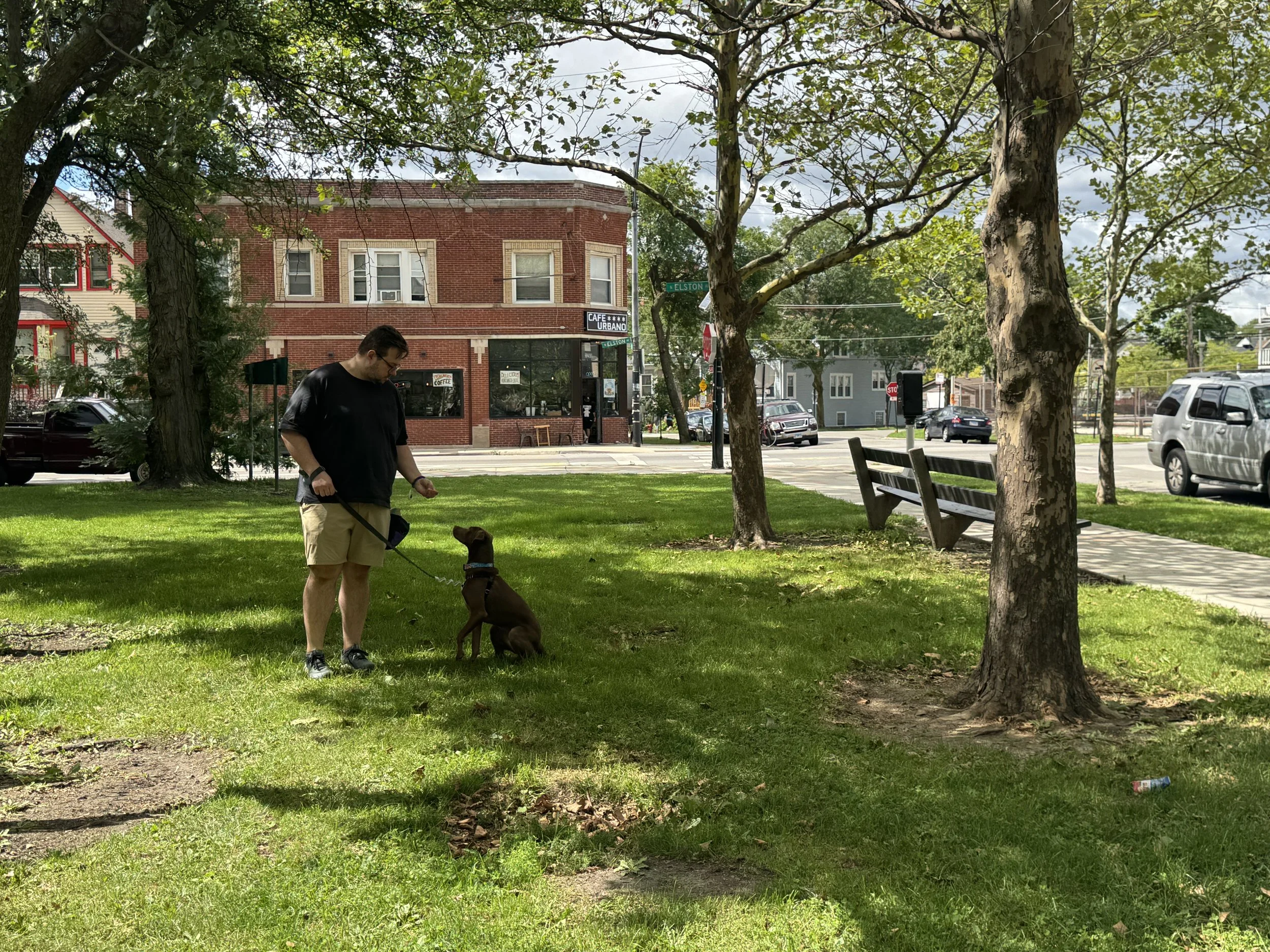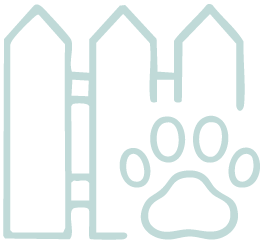
Reactive Dog Training in Chicago
Helping dogs with big feelings find calm & confidence so you can enjoy life together.
Reactivity is when a dog overreacts to certain triggers in their environment — like other dogs, strangers, bikes, or cars. Instead of staying calm, they might bark, lunge, or whine because they’re feeling stressed, excited, or frustrated.
Reactive dog training focuses on helping dogs learn new ways to cope with those situations. Unlike basic obedience, it’s about changing how your dog feels about triggers while teaching alternative, calmer responses. Many families searching for “reactive dog training near me” are looking for relief from these daily struggles, and that’s exactly what our team provides.
Barking, lunging, or pulling when on leash and spotting another dog, person, or distraction.
Leash Reactivity
Dog Reactivity
Strong responses directed at other dogs, whether on walks, at the park, or behind barriers.
People Reactivity
Noise Reactivity
Barking, lunging, or pulling when on leash and spotting another dog, person, or distraction.
Reacting to strangers, delivery drivers, joggers, or guests — sometimes out of fear, sometimes from excitement.
Intense reactions when separated by fences, windows, or gates, even if calmer without the barrier.
Motion Reactivity
Chasing or lunging at fast-moving things such as bikes, scooters, skateboards, or cars.
Barrier Reactivity

How we can help
Our certified trainers will help uncover why your dog is reacting and give you the tools to help change how they feel about their triggers.
Reactivity Group Class
$450 / 6 weeks
This class is for dogs with leash reactivity/frustration in a safe, group setting. Class size is 4 dogs and taught by two certified trainers.
Private Lessons
$135 / 1 session
$625 / 5 pack
Personalized 1-on-1 training in your home, virtually or at Copilot in Avondale. Sessions last one hour.
In-Home Day Training
$1,170 / 3 weeks
$1,440 / 4 weeks
Your pup will work with us for 1-hour sessions, 2x a week. We’ll regroup on your pup’s progress with a 1x1 together on the weekend.
Top reasons for reactivity
Fear
Some reactive dogs respond with barking, lunging, or avoiding when they feel unsafe or unsure. This is their way of saying, “I need space.”
HOW WE HELP
Our reactive dog training focuses on building their confidence and helping them feel secure in new environments.
Frustration
When a dog wants to greet another dog, person, or explore a scent but can’t, that pent-up energy can turn into reactivity.
HOW WE HELP
Through our leash reactivity training, we teach your dog to manage excitement and stay engaged with you during walks.
Overexcitement
Highly social dogs often react with big energy when they see people or other dogs, especially in busy Chicago settings.
HOW WE HELP
We channel that enthusiasm into calm, polite behavior so they can enjoy the city without overwhelming you or themselves.
What to look out for
Common reactivity behaviors
Barking, growling, or lunging
Pulling hard on the leash
Whining, pacing, or trembling
Staring or “locking on”
Overexcited greetings
Sudden body language changes
And more
We promise, your dog isn’t being “bad” — They’re just having a hard time 🖤
FAQs
-
Yes! With the right plan and consistency, reactive dogs can make incredible progress. If you’ve wondered, “Can you train a reactive dog?”, the answer is absolutely and we’ll guide you through the process step by step.
-
Every dog is different. Some families see changes in just a few weeks, while others may need a few months. Factors include your dog’s triggers, practice at home, and whether you choose private sessions, group classes, or a reactive dog board and train.
-
Nope! Reactivity is about big, strong responses (barking, lunging, pulling, etc.) but it doesn’t always mean a dog wants to fight.
Many reactive dogs are frustrated or scared, not aggressive.
-
We’ll never say never, but not usually.
Reactivity tends to stick around (and sometimes worsen) without training The good news?
With the right guidance, dogs can learn calmer ways to cope.
-
It’s not about being “stricter.”
Reactivity isn’t solved by punishment; it’s solved by teaching your dog new coping skills and helping them feel safer.
-
Reactivity isn’t like a broken bone that heals and disappears. But with training, dogs can make huge progress and learn to stay calm in situations that once set them off.
-
Nope!
Dogs still need exercise and enrichment. With the right training plan, you can make walks safe and positive while working on their reactivity.
-
Our trainers specialize in leash reactivity training in Chicago. We’ll show you how to train a reactive dog on leash by breaking down stressful situations, teaching coping skills, and practicing in safe, controlled environments.
Start Reactive Dog Training in Chicago
If you’re looking for a trusted reactive dog trainer in Chicago, Copilot Dog Training is here to help. We offer private training, group classes, and day training programs to fit your dog’s needs.
Whether you’ve searched for “reactive dog training near me” or need help with leash reactivity training in Chicago, our trainers will guide you step-by-step. From understanding the difference between a reactive vs. aggressive dog to learning how to train a reactive dog on leash, we’ll help you build calmer walks and a stronger bond with your pup.















